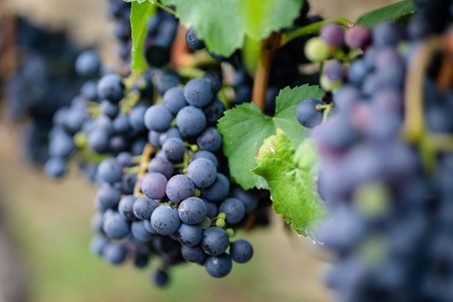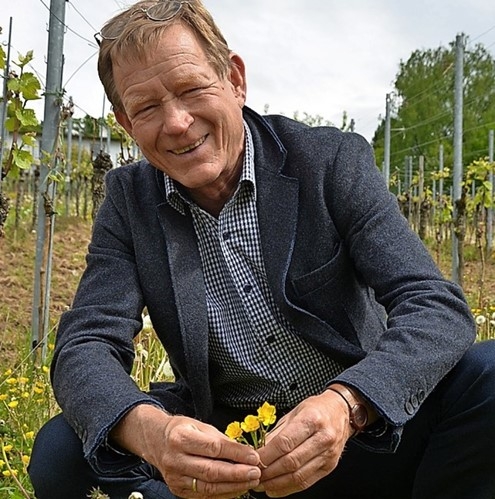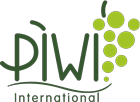
From Klaus Riexinger Mon, October 26, 2020 at 2:26 pm
Baden-Württemberg wants to save a large amount of chemical pesticides in viticulture - anchored in law. Varieties that are resistant to pests should help. They are bred in Freiburg.

- Viticulture also has to rethink - and increasingly do without pesticides Photo: Christoph Schmidt (dpa)
Organic wine growing in Baden is having a hard time. So far only six percent of the area has been dispensed with chemical sprays, while it is almost ten percent nationwide. “The bad thing in Baden is the combination of warm and damp weather in the course of climate change,” says Paulin Köpfer, Chairman of Ecovin Baden. The association represents the interests of organic vintners. The vines are therefore exposed to severe fungal attack in some years. While conventional vintners have the entire arsenal of chemical sprays available to protect them, organic vintners are only allowed to use a limited amount of copper. This can become a problem in difficult years. The number of organic winegrowers in Baden even declined a few years ago. 20 years ago, Baden was still considered a leader in organic viticulture.
With the Biodiversity Strengthening Act passed this summer, the country has put itself under pressure. By 2030, 30 to 40 percent of farms should have converted to organic farming and up to 50 percent chemical-synthetic spraying agents should be saved. Viticulture must also make its contribution to this.
The Ministry for Rural Areas (MLR) wants to achieve the goal with a regional market economy approach: The increasing demand for organic products should be served as best as possible with products from domestic production. In viticulture, State Agriculture Minister Peter Hauk (CDU) is placing his hopes in the research of the state-owned State Viticulture Institute in Freiburg (WBI). In particular, the fungus-resistant grape varieties (Piwis) grown at the WBI should play a key role. With these robust new varieties, an average of 70 percent can be saved on spraying agents.
Often the breeders do not experience what will become of their breeds
This knowledge is not new. Some Piwis have been available for decades. But now viticulture has to deliver. The social pressure should not be underestimated, as the broad support for the radical demands of the popular initiative “Save the bees” showed. In the meantime, however, WBI director Rolf Steiner has noticed a careful rethinking. “Something is happening,” says Steiner. More and more winegrowers - including those who run conventionally - are interested in Piwis. In addition to nature, they are also concerned with their own health and money. Because chemistry is expensive. For one hectare of vines, 1000 euros per year have to be expected.
The problem, however, remains the reluctance of customers, even though considerable quality has long been achieved with Piwis. For this reason, the ministry is now strengthening marketing and is granting 240,000 euros for a corresponding position at the WBI for two years. The action program is called "Establishing wines made from fungus-resistant grape varieties on the market". At the WBI there were already concerns that the trend in Baden would be overslept. For some time now, French and Italian viticulture have been among the main buyers of Freiburg varieties.
Is the proportion of new breeds increasing?
The WBI knows both sides of the business from its own experience: 15 percent of its own 37 hectares of vines are farmed organically, the rest conventionally. The aim is to further increase the organic share - as before, exclusively with Piwis, emphasizes Steiner. He is convinced that the proportion of new breeds will rise continuously in the next few years. Presumably at the expense of varieties such as Riesling and Müller-Thurgau, which are increasingly falling victim to climate change in southern Germany.
Cultivating vines by crossbreeding is tedious and tedious. After 20 years, a maximum of three out of 10,000 seeds will be approved as a new Piwi variety. Most of the time, the breeders did not even experience what would become of their breeds during their active time, says Steiner. “Their commitment is all the more admirable.” Sometimes breeding successes only turn out to be a flop in practice. With Cabernet Carbon, the Freiburg-based company created a red wine that was internationally well received. The variety is so low-yielding that you would have to charge 50 or 60 euros for a bottle in order to earn money, says state winery manager Bernhard Huber. That is utopian. With a heavy heart the vines were cleared. Nevertheless, the 100-year history of breeding the resistant varieties at the WBI finally seems to be bearing fruit.
Background: 100 years of research for viticulture
At the beginning of the 20th century, viticulture in Baden was on the ground. Vine diseases and pests were to blame. When further vineyards were given up after the First World War because of the rampant labor shortage, the Baden state parliament decided to found a viticulture institute (WBI) in Freiburg. The aim was to help winemakers fight against vine diseases. In the 100 years of its existence, the WBI has achieved several successes, some of which are of global importance. This includes fighting grape moth, a butterfly that attacks grapes and flowers. In 1911 and 1912 the damage from the insect was up to 80 percent of the harvest. Together with the chemical company BASF, the WBI developed a pheromone trap: With the help of artificially released pheromones, the male butterflies are so confused that they cannot find the females to mate. This biological pest control means that insecticides are rarely used in viticulture. Research into this began in 1937. The traps have been in use since 1987.
The Meteo forecasting system was also invented in Freiburg, which shows winegrowers exactly when there is a risk of fungal attack and when they should take appropriate action against it. One of the main tasks of the WBI is vine cultivation: plants that are robust and produce tasty fruit are propagated for the market. The WBI is considered the largest clone breeder in Germany. "FR 1801" from the WBI is the most widespread Pinot Noir in Germany. In terms of scope and experience, the WBI is also a leader in the breeding of fungus-resistant varieties.
"Suddenly the Piwis are interesting for everyone"
From Klaus Riexinger
Mon, October 26, 2020
BZ-INTERVIEW with Ecovin boss Paulin Köpfer about concerns of organic wineries and the change of direction of the state government.
 Paulin Köpfer Photo: Gerold Zink
Paulin Köpfer Photo: Gerold Zink
A year and a half ago, the organic wine association Ecovin Baden complained that the country was doing too little for the environmentally friendly, fungus-resistant vines. With the key issues paper on strengthening biodiversity, that has now completely changed, says Ecovin chairman Paulin Köpfer in an interview with Klaus Riexinger.
BZ: Mr. Köpfer, after the wet summer of 2016 and crop failures due to fungal attack, organic wine growing was in an existential crisis. How does it look today?
Köpfer: As far as mushroom printing is concerned, the following vintages from 2017 to 2020 were relaxed. But the problem remains. Every year we are tense because we don't know what to expect. Since the ban on phosphonate for organic viticulture, we have lacked an elementary protective agent against downy mildew - downy mildew.
BZ: And how is membership development at Ecovin?
Köpfer: We are not growing very strongly at the moment because downy mildew is too great a risk for many. As a result, we lost five member companies in 2016. We currently have 75 members.
BZ: How realistic is it that 30 to 40 percent of viticulture will have switched to organic by 2030?
Köpfer: It's not that easy. Essentially, it will depend on two things: Perhaps the EU is still moving on the subject of phosphonate approval, the second point is: How will we get on with the Piwis?
BZ: With the Piwis, the country does not rely on bans, but on the market. Is that the right strategy?
Köpfer: Fully and completely. The associations of organic farming (AöL) have been demanding this strategy from politics for years. The demands suddenly got a tailwind through the key issues paper of the state government.
BZ: Both the Rural Ministry and the Viticulture Association have given up their reservations about Piwis. The Piwis even play a central role in the country's organic offensive. A success for you, right?
Köpfer: That's great, but that too goes back to our work in the AöL. We have been pointing out the importance of Piwis in organic farming for years. In 2016 we said: If there is no such thing as phosphonate, then we have to do something for the Piwis.
BZ: Which happened three years later.
Köpfer: Yes. That is the crucial point: Because the state government has to reduce the use of pesticides, Piwis suddenly become interesting for the entire viticulture sector. Ecovin has been in talks with the Ministry of Rural Areas, the State Viticulture Institute and the Baden Viticulture Association for a long time. We agree that you have to apply for the Piwis. Only when the demand is there is it economically viable to grow the new varieties. We have proven that we can produce super qualities with these varieties. Now the interest of consumers has to be aroused. I see a lot of catching up to do here.
Paulin Köpfer, 62, operations manager at the Zähringer winery in Heitersheim, has been chairman of Ecovin Baden since 1991.

